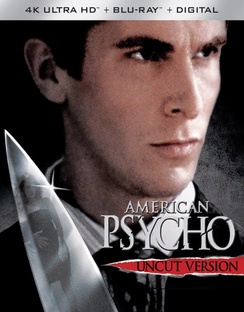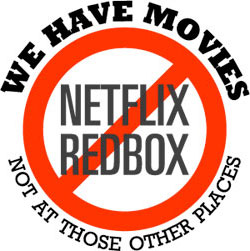Review: 'American Psycho' kills on 4K UHD
Posted Monday, September 24, 2018 at 4:51 PM Central
by John Couture

Over the span of six months during the end of 1999 and the start of 2000, two films would come out that would forever change the scope of the unreliable narrator in movies. The first was Fight Club that would introduce me to my new favorite author Chuck Palahniuk. After the hubbub that wasn't Y2K settled down, American Psycho adapted a Bret Easton Ellis novel that many said could not be translated onto the silver screen.
While both of these films aimed to play with narration and audience expectations, they both did so in different ways. Fight Club blurred reality with fantasy, while American Psycho tried to keep everything in reality despite the book's ambiguity.
American Psycho pokes fun at the hedonistic 1980s with the help of protagonist Patrick Bateman who works on Wall Street during the day and brutally murders people at night. As he tries harder to fit in with his friends and fiancee, Patrick increasingly loses his grip on his ever-eroding sanity as his body count rises.
While the book presents things in a more ambiguous way suggesting that events or even whole characters are merely products of Patrick Bateman's imagination, the film attempts to ground things in reality. People were really killed and Patrick Bateman is a serial killer.
While both tactics present their own positives and negatives, I feel that by taking the hard and fast rule of fact, the film misses an opportunity for cinematic immortality. Don't get me wrong, American Psycho is still an amazing film and wonderful achievement in adaptation, I just preferred the way in which the book muddies reality.
I think it becomes increasingly clear as the events in the movie play out that Patrick is losing his mind rapidly. So, it would also make sense that his own sense of reality would shift, thus presenting the audience with a completely unreliable narrator and leave us in the position to decipher for ourselves what is real and what is only in his head. In the film, Patrick begins to realize his increasing psychosis and sets up the climatic events that I think might have been better left unresolved.
American Psycho is the film that launches the career of Christian Bale and he is absolutely electric as Patrick Bateman. Even early in his acting career, it is evident that Christian is going to be an extremely successful actor. He controls the screen even as he's losing his mind. In fact, it's precisely this juxtaposition that results in creating such an iconic character.
The film enjoys a robust cavalcade of stars ranging from Reese Witherspoon to Jared Leto to Josh Lucas. The cast of A-listers on cinematic greatness is phenomenal and paced by a great tun by veteran actor Willem Dafoe. He is the ultimate foil to Patrick Bateman's games and the cat-and-mouse scenes between he and Christian Bale are wonderful.
The film is as much a condemnation on the 1980s as it is the yuppie culture that this time period bred. The film presents it in much the same way as the chicken and egg riddle. Did the 1980s cause yuppies, or did the yuppies infect the decade? It's a serious question that is hard to answer because the time was certainly ripe for the rise of this materialistic culture, but it's hard to think that these young professionals wouldn't enjoy the same self-centeredness in any given era.
The Dolby Vision transfer is a welcome gift to this film as the existing Blu-ray version of American Psycho simply upconverted the inferior DVD transfer. The result is a robust film with HDR that presents the film as intended for the first time since perhaps 2000 when it still played in theaters. The movie features a lot of dark scenes so the added black levels are amazing and really help to make the film shine brightly, but in a dreary way - if that makes sense.
The Dolby Atmos audio track is another improvement over the existing Blu-ray audio track. The film features a heavy 1980s score and music from Huey Lewis and the News and Phil Collins that really jumps out of the film on this version. As the music is critical in placing the film as well as the inner workings of Patrick Bateman's head, the upgraded audio track is worth the price alone.
At the end of the day, American Psycho is one of those films that defined not only the era in which it came out but the time period in which it was set. As a child of the late '70s and early '80s, I could relate with many of the cultural references, but as I've gotten older, they continue to become more meaningful as cultural touchstones of a forgotten place and time. It wasn't all St. Elmo's Fire in the 1980s. It was a weird time too and American Psycho helps to preserve that legacy.






